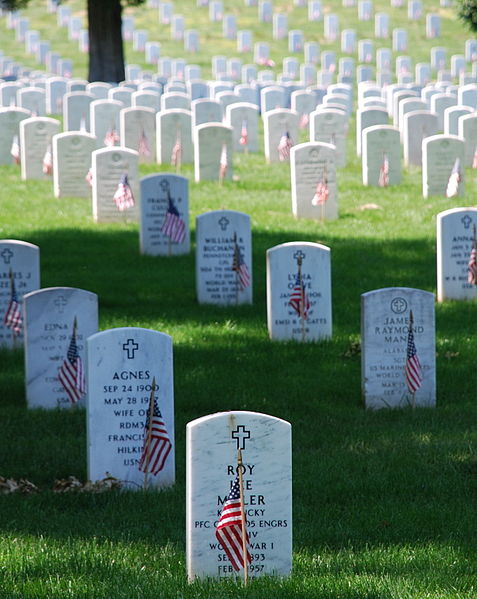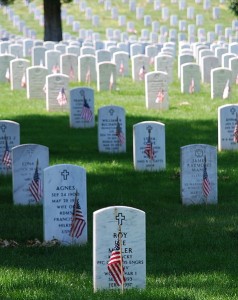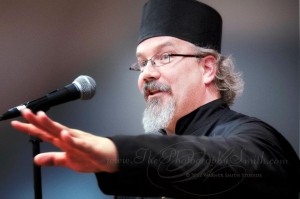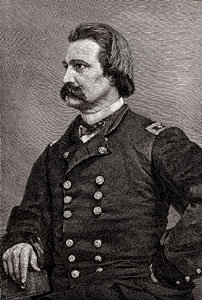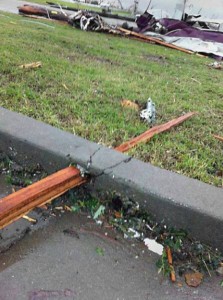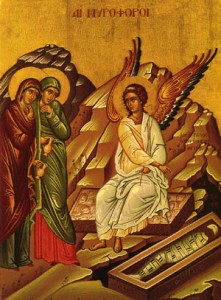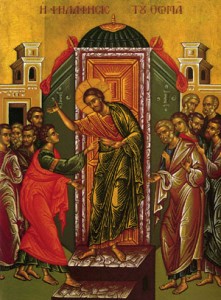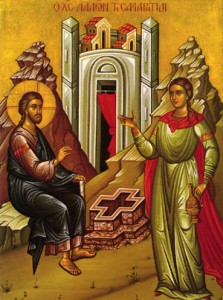 All during the period after Easter we read from the Book of Acts. The book of Acts tells the story of the formation of the early church and the ministry of St. Paul. We see a shift starting from the ministry of the original Apostles to that of others. The Book of Acts also records for us the election of bishops, in the replacement of Judas, and the first council of the Church to determine the answer to a question. And today we see the church in action.
All during the period after Easter we read from the Book of Acts. The book of Acts tells the story of the formation of the early church and the ministry of St. Paul. We see a shift starting from the ministry of the original Apostles to that of others. The Book of Acts also records for us the election of bishops, in the replacement of Judas, and the first council of the Church to determine the answer to a question. And today we see the church in action.
We heard this morning about how the message of the Gospel had spread pretty far. Up to this point the Apostles had only been preaching to the Jews but the message has managed to reach people all on its own. Sometimes we do not have to preach the Good News it just sort of makes it way around.
When word reached the Church in Jerusalem that someone was preaching the Word, they sent out a representative, Barnabas, to see what was going on. You see, even in the early days of the church, it was important to make sure that those who were preaching in the name of Jesus were in fact preaching the right message. Barnabas was overjoyed with what he saw and heard and went to get Paul and brought Paul back to Antioch to preach and teach. Scripture tells us he remained there for a year teaching and making sure the Church has a proper foundation.
Antioch is the place where the followers of Jesus Christ were first called Christians.
So in this verse we see some of the first missionary activity of the Church, but we also see some of the first Philanthropy in the Church in the sending of aid to the Church where famine has broken out.
I have said this before, but we are commanded to love our neighbor. We heard on the Sunday of the Last Judgment, Jesus telling His followers by what measure they would be judge. He goes on to talk about those who are hungry, naked, and sick and in prison and whether or not we helped them. You see, aid to those in need is not optional for Christians.
The Church we read about today from the Book of Acts was in need. The people were suffering from a famine and the Church decided to send aid. But the way they sent the aid is what is important for us to hear. “Every one according to his ability.” Everyone is to help according to their ability. Now what does that mean?
Some of us have been blessed by God with money. Those of us who have been so blessed should give to their ability as determined by them in consultation with their Spiritual Father. Some of us have been graced by God with strong backs, strong hands, and the ability to perform physical labor. We are to give to those in need according to our ability. And some of us have been graced by God with the ability to pray for those in need. You see it is not just about money, or physical labor or even prayer, it is about doing what we can with the gifts that God has given us.
The interesting point of all of this today is that the same Church that the writer of the Book of Acts wrote about and their need, is the same Church that on this very day, is in need.
I don’t think I need to tell you that for the last few years of the so called “Arab Spring” Christians in the Middle East have been under persecution and dare I say extinction. There is a concerted effort by radical Islam to cleans the Middle East of all traces of Christianity. This harkens back to the time of the Nazi persecution of the Jews prior to and during the time of World War II.
If I understand my history correctly, and I believe I do, the war in Europe was because one man was trying to exterminate a race of people and replace that with the master race. Now I know that the reasons for a war are never that simple, but the United States, and other Nations, have sent the military all around the world to save people in all sorts of situations, but in this case we are funding those who are actually doing the killing. Under the guise of bringing democracy to an oppressed people, we are sending aid to the very people who have perpetrated this holocaust on the Christian population in the Middle East.
The Church in the Middle East is desperately in need of our aid!
But what can we do? How can we help?
First and foremost we can pray. If you are not praying for the Christians in the Middle East now, start to pray for them. Prayer is the simplest thing that we can do. We can ask God to intercede in this, and every situation to bring comfort to those people if that is His will. We can support the IOCC with funds. IOCC is on the ground in the Middle East bringing what comfort it can and works as an advocate at the highest levels of government. You can write, call, send emails, if you are active in the Social Media you can post stories to raise awareness of the situation and call people to action. And you can educate yourself on what is going on. It is time for us to remove our heads from the sand and realize that is happening in the world. Christ demands us to love our neighbor and that is not just the person living next door to you!
The entire message of the Gospel is one of action and it is clear today that we are being called to action. We can no longer afford to just sit by and watch this happen, we have the power, the power of God, to defeat the enemy and we must join our voices to the thousands of others. By ourselves we are small, but together we are Great!
Christ is Risen!

